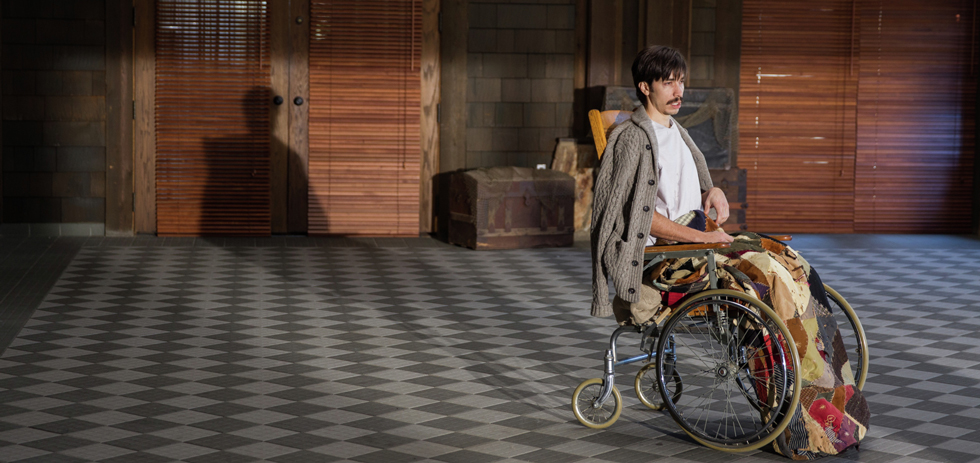
To call Tusk a film of squandered potential seems odd, considering the plot is derived from a ridiculous, almost ironic, film pitch on a podcast and said plot follows a man who is kidnapped and surgically turned into a walrus, but Kevin Smith’s feature proved more disappointing than anything else. It exists as a dare of a film and, in that vein, holds the prospect of being completely deranged in the best possible way, yet so much of the film is tempered and middling, moving from an occasionally amusing knockoff of The Human Centipede sans actual gore to a cringe-inducing and unfunny detective narrative. Where Smith managed to play into genre expectations and distinctly reject them in Red State, his best work since Chasing Amy, here his newest feature lacks originality and remains perhaps a curio designed only for a small, insular audience of podcast listeners.1
The film centers on a podcaster, Wallace (Justin Long) who hosts a show called The Not-See Party (get it?), that is apparently hilarious and popular, with his best friend Teddy (Haley Joel Osment chanelling Smith himself). After Wallace manages to snag an interview with a now-maimed YouTube celebrity who he has relentlessly been mocking on his show, he travels to Canada alone, against the wishes of his girlfriend Ally (Génesis Rodríguez). When he arrives, there’s no interview to be had – suicide is used as a gag here, perhaps a limp point about faux-compassion in media representation – and Wallace searches for a new interview subject, which appears in the guise of an old sailor, Howard Howe (Michael Parks), who promises interesting stories and, instead, drugs Wallace and surgically converts him into a walrus.
The best thing in this film, without a shadow of a doubt, is Parks, playing the script straight and delivering a hilarious and terrifying performance – you’ll never hear “Itsy Bitsy Spider” the same way again. The first third of the film uses this insanity to almost make up for the lack of genuine horror – we have basic elements, an out of frame villain, a creeping score, quick shots of bloodied utensils, but the film appears quite restrained, rendering the first act of mutilation merely a punchline. There is a surgery sequence where we see merely the end of the process, which is grotesque but not particularly horrifying, though the actual reveal of the walrus-man hybrid is both stunningly ridiculous and disturbing, one of the most effective elements in the film.
This section of the film manages to be a mostly amusing narrative and moderately weak genre-play anchored by an insane Michael Parks performance, the introduction of Guy Lapointe (played by a famous actor who will remain unnamed here), a Québécois detective who shares a name with a former ice hockey defenceman, who is on the trail of Howe, and who almost single handedly sucks the life out of Smith’s film. There’s something exciting, initially, in seeing [redacted] play an unhinged comedic character in the vein of some of his earlier work with [director who made Frankenweenie], yet this promise is quickly snuffed out upon hearing [redacted]’s dreadful accent and the laboured humour surrounding his dialogue. At first, it appears that his repetition and struggle to express ideas clearly in English is a vague parody of detectives like Poirot but, alas, as a flashback sequence shows us, this joke is one-note, and it’s a terrible sounding note at that. A flashback sequence in which Lapointe meets Howe (Parks’ performance in this scene is unfortunate, almost bordering on offensive, as he puts on the guise of a man with mental difficulties), is the low point of the film, each joke landing with a thud as their conversation drains all of the dark tone of the walrus narrative.
From this point onwards, the film never regains its footing, despite a funny battle sequence between Parks and Long near the film’s end. The detective narrative seems to take hold as the A-story and its is a supremely weak one, Rodríguez and Osment both the straight character to Lapointe’s “absurdist” characterisation. The actual conclusion of the film underwhelms too, built around a cruel visual gag and the film’s underwritten and almost implausible emotional connection between Wallace and Ally.
Overall, Smith seems to have stumbled in taking on the horror genre, though pitched as a ‘midnight movie’ when it premiered in that slot at TIFF this year, it lacks genuine scares and staying power. Save a few shots and Parks’ performance it’s a forgettable affair, which, for a Kevin Smith film, is very disappointing indeed.
Around the Staff
| Felix Hubble |
